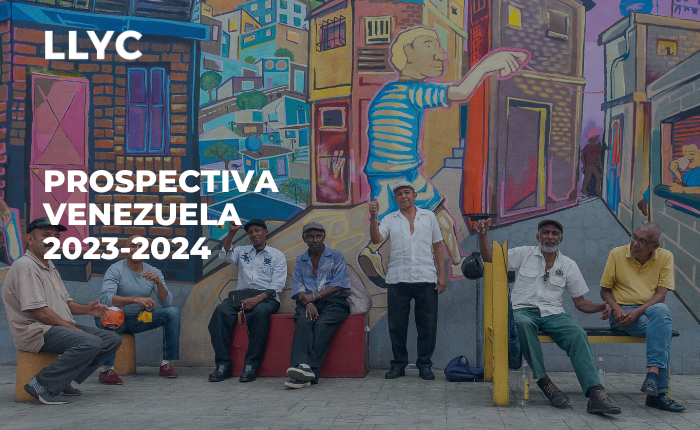-
TrendsPublications and Reports
-
CountriesColombia
Venezuela has shown signs of recovery since 2021, following a severe recession between 2013 and 2020 that reduced its economy to 25% of its original size. The bolivar’s devaluation and hyperinflation that characterized the recessionary period were caused by a combination of factors, including the fall of international oil prices, the nationalization of the private sector, loss of productive capacity, trade and price controls, and corruption cases that led to international sanctions.
In recent years, the Venezuelan economy has grown over 6% annually, thanks to dollarization, partial adjustment of fuel prices, changes in food price controls, and a new fiscal balance strategy. It’s expected it will continue to grow at 5% in 2023, despite the upcoming opposition primaries in October and the presidential 2024 elections.
LLYC, a global marketing, communication, and public affairs consultancy, published the “Venezuela Outlook for 2023-2024” report analyzing Venezuela’s economic and political situation. The report discusses the potential outcomes and implications of the upcoming Venezuelan election, including scenarios that may arise depending on whether there is a change in government or if Nicolás Maduro remains in office.
As per the report, the country’s economic growth has resulted in significant effects and variations, including the restoration of bilateral relations with Colombia and Brazil and the relaxation of international sanctions imposed by the United States, positively impacting the country’s geopolitical standing. It also examines the opportunities and risks of industries in a country about which there is limited information.
“Over the next 18 months, it is crucial to assess the role and impact of private capital, regardless of its scale, and its purpose in the political, economic, and international context surrounding the elections and democratic negotiations,” said Maria Esteve, Partner and Managing Director of LLYC’s Andean Region.
LLYC’s experts have identified two major scenarios:
– The Venezuelan government does not give in to U.S.-sanctioned-driven pressures to permit electoral observers. This would guarantee Nicolás Maduro’s continuity for a third term and isolate the country from the international community, which could lead to Venezuela strengthening its ties with its “chavismo” allies, further disrupting the oil market. However, it will also maintain the stable macroeconomic approach that the government has implemented in recent years.
– Nicolás Maduro yields to the pressures of electoral observation. This leads to the injection of capital from the funds that were withheld for his electoral campaign via social relief and empowers the opposition candidate, who is more likely to win the election. As a result, Venezuela is reintegrated into the international market and institutional framework. Nevertheless, the change of government generates uncertainty due to the new stabilization measures.
Beyond the presidential election and its effects, the LLYC report discusses the following scenarios that could occur regardless of the electoral outcome.
– The new macroeconomic approach facilitates trade between Venezuela and its long-standing partners (Netherlands and India), like-minded allies (China, Turkey, and Iran), and strategic commercial partners (United States, Brazil, and Colombia), providing benefits for the private sector.
– The downward trend in oil prices, coupled with insufficient investment in its infrastructure, would hinder a significant increase in daily production and impact the diversification of the country’s economy. As a result, the country’s growth would be slower than its current potential.
According to experts, these recent developments have led to higher and faster investment returns in Venezuela than in similar economies.
LLYC Bogota’s specialized task force, the Venezuelan Desk, delivers integrated knowledge on the country’s situation, including economic, political, public opinion, trade, and regulatory aspects, identifying opportunities and risks.
Read the full report here: Link



